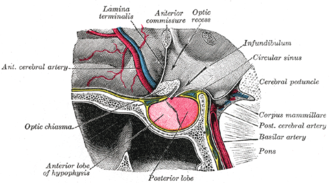Pickardt syndrome

Editor-In-Chief: Prab R Tumpati, MD
Obesity, Sleep & Internal medicine
Founder, WikiMD Wellnesspedia &
W8MD's medical weight loss NYC, sleep center NYC
Philadelphia medical weight loss and Philadelphia sleep clinics
| Pickardt syndrome | |
|---|---|
 | |
| Synonyms | N/A |
| Pronounce | N/A |
| Specialty | N/A |
| Symptoms | Hypothyroidism, growth retardation, obesity, delayed puberty |
| Complications | Intellectual disability, cardiovascular disease |
| Onset | Childhood |
| Duration | Chronic |
| Types | N/A |
| Causes | Hypothalamic dysfunction |
| Risks | Pituitary gland damage or dysfunction |
| Diagnosis | Blood tests, hormone level assessment, MRI |
| Differential diagnosis | Hypopituitarism, congenital hypothyroidism |
| Prevention | N/A |
| Treatment | Hormone replacement therapy, thyroid hormone supplementation |
| Medication | N/A |
| Prognosis | Variable, depends on treatment |
| Frequency | Rare |
| Deaths | N/A |
A rare disorder involving the pituitary gland
Pickardt syndrome is a rare endocrine disorder characterized by hypothyroidism due to dysfunction of the pituitary gland. This condition is named after the German physician Friedrich Pickardt, who first described it. The syndrome is associated with a variety of symptoms resulting from insufficient production of thyroid-stimulating hormone (TSH), leading to decreased activity of the thyroid gland.
Pathophysiology[edit]
The pituitary gland, often referred to as the "master gland," plays a crucial role in regulating various hormonal functions in the body. In Pickardt syndrome, the pituitary gland fails to produce adequate levels of TSH, which is essential for stimulating the thyroid gland to produce thyroxine (T4) and triiodothyronine (T3). This results in secondary hypothyroidism, where the thyroid gland itself is normal but underactive due to lack of stimulation.
Symptoms[edit]
The symptoms of Pickardt syndrome are similar to those of other forms of hypothyroidism and may include:
- Fatigue and lethargy
- Weight gain
- Cold intolerance
- Dry skin and hair
- Constipation
- Depression
- Cognitive impairment
Diagnosis[edit]
Diagnosis of Pickardt syndrome involves a combination of clinical evaluation and laboratory tests. Blood tests typically show low levels of TSH and low levels of thyroid hormones (T3 and T4). Imaging studies, such as magnetic resonance imaging (MRI), may be used to assess the structure of the pituitary gland.
Treatment[edit]
Treatment of Pickardt syndrome focuses on hormone replacement therapy to compensate for the deficiency of thyroid hormones. Patients are usually prescribed levothyroxine, a synthetic form of T4, to normalize thyroid hormone levels and alleviate symptoms. Regular monitoring of hormone levels is essential to ensure effective management of the condition.
Prognosis[edit]
With appropriate treatment, individuals with Pickardt syndrome can lead normal, healthy lives. However, lifelong hormone replacement therapy is typically required, and regular follow-up with healthcare providers is important to adjust medication dosages as needed.
See also[edit]
Ad. Transform your life with W8MD's Budget GLP-1 injections from $49.99


W8MD offers a medical weight loss program to lose weight in Philadelphia. Our physician-supervised medical weight loss provides:
- Weight loss injections in NYC (generic and brand names):
- Zepbound / Mounjaro, Wegovy / Ozempic, Saxenda
- Most insurances accepted or discounted self-pay rates. We will obtain insurance prior authorizations if needed.
- Generic GLP1 weight loss injections from $49.99 for the starting dose of Semaglutide and $65.00 for Tirzepatide.
- Also offer prescription weight loss medications including Phentermine, Qsymia, Diethylpropion, Contrave etc.
NYC weight loss doctor appointmentsNYC weight loss doctor appointments
Start your NYC weight loss journey today at our NYC medical weight loss and Philadelphia medical weight loss clinics.
- Call 718-946-5500 to lose weight in NYC or for medical weight loss in Philadelphia 215-676-2334.
- Tags:NYC medical weight loss, Philadelphia lose weight Zepbound NYC, Budget GLP1 weight loss injections, Wegovy Philadelphia, Wegovy NYC, Philadelphia medical weight loss, Brookly weight loss and Wegovy NYC
|
WikiMD's Wellness Encyclopedia |
| Let Food Be Thy Medicine Medicine Thy Food - Hippocrates |
Medical Disclaimer: WikiMD is not a substitute for professional medical advice. The information on WikiMD is provided as an information resource only, may be incorrect, outdated or misleading, and is not to be used or relied on for any diagnostic or treatment purposes. Please consult your health care provider before making any healthcare decisions or for guidance about a specific medical condition. WikiMD expressly disclaims responsibility, and shall have no liability, for any damages, loss, injury, or liability whatsoever suffered as a result of your reliance on the information contained in this site. By visiting this site you agree to the foregoing terms and conditions, which may from time to time be changed or supplemented by WikiMD. If you do not agree to the foregoing terms and conditions, you should not enter or use this site. See full disclaimer.
Credits:Most images are courtesy of Wikimedia commons, and templates, categories Wikipedia, licensed under CC BY SA or similar.
Translate this page: - East Asian
中文,
日本,
한국어,
South Asian
हिन्दी,
தமிழ்,
తెలుగు,
Urdu,
ಕನ್ನಡ,
Southeast Asian
Indonesian,
Vietnamese,
Thai,
မြန်မာဘာသာ,
বাংলা
European
español,
Deutsch,
français,
Greek,
português do Brasil,
polski,
română,
русский,
Nederlands,
norsk,
svenska,
suomi,
Italian
Middle Eastern & African
عربى,
Turkish,
Persian,
Hebrew,
Afrikaans,
isiZulu,
Kiswahili,
Other
Bulgarian,
Hungarian,
Czech,
Swedish,
മലയാളം,
मराठी,
ਪੰਜਾਬੀ,
ગુજરાતી,
Portuguese,
Ukrainian